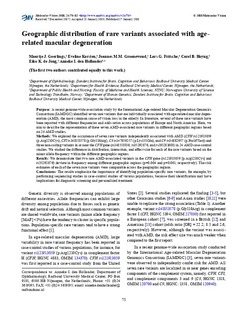Geographic distribution of rare variants associated with age-related macular degeneration
Geerlings, Maartje J; Kersten, Eveline; Groenewoud, Joannes M M; Fritsche, Lars; Hoyng, Carel B; De Jong, Eiko; Den Hollander, Anneke I.
Journal article, Peer reviewed
Published version
Permanent lenke
http://hdl.handle.net/11250/2617595Utgivelsesdato
2018Metadata
Vis full innførselSamlinger
Originalversjon
Molecular Vision. 2018, 24 75-82.Sammendrag
PURPOSE:
A recent genome-wide association study by the International Age-related Macular Degeneration Genomics Consortium (IAMDGC) identified seven rare variants that are individually associated with age-related macular degeneration (AMD), the most common cause of vision loss in the elderly. In literature, several of these rare variants have been reported with different frequencies and odds ratios across populations of Europe and North America. Here, we aim to describe the representation of these seven AMD-associated rare variants in different geographic regions based on 24 AMD studies.
METHODS:
We explored the occurrence of seven rare variants independently associated with AMD (CFH rs121913059 (p.Arg1210Cys), CFIrs141853578 (p.Gly119Arg), C3 rs147859257 (p.Lys155Gln), and C9 rs34882957 (p.Pro167Ser)) and three non-coding variants in or near the CFH gene (rs148553336, rs35292876, and rs191281603) in 24 AMD case-control studies. We studied the difference in distribution, interaction, and effect size for each of the rare variants based on the minor allele frequency within the different geographic regions.
RESULTS:
We demonstrate that two rare AMD-associated variants in the CFH gene (rs121913059 [p.Arg1210Cys] and rs35292876) deviate in frequency among different geographic regions (p=0.004 and p=0.001, respectively). The risk estimates of each of the seven rare variants were comparable across the geographic regions.
CONCLUSIONS:
The results emphasize the importance of identifying population-specific rare variants, for example, by performing sequencing studies in case-control studies of various populations, because their identification may have implications for diagnostic screening and personalized treatment.

